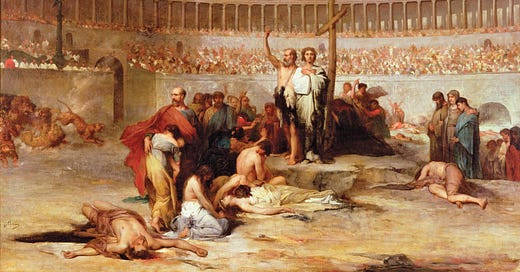This dramatic monologue is based on a famous letter of Pliny’s, which was the first recorded instance of Rome mentioning Christians. The letter is relatively short. You can read it here. It was written sometime between 111-113 AD, when Pliny was the governor of Bithynia. Only two hundred years later the Emperor of Rome would convert to Christianity.
Pliny the Governor
That look upon his face as they unrack the women—whose moaning muscles on the floor try and cannot into a foetus reform— is made of neither pity nor remorse. Two deaconesses of the ministry told by tortured, breathless turns the tenets of the Christian mystery. The umbrage he took, like his narrow shadow in the evening redness, follows him home. I found nothing but debased superstition carried to great lengths. By lamp he wrote, heedful at his post, to Caesar Trajan. Sir, they worship weakness over strength. Their god, scourged and fixed upon the cross, produces in them not humiliation but triumph. And though perverse, there’s naught, to my thinking, that contravenes the law. No precedents for penalties have I uncovered from the archives of the courts. Therefore I write, inquiring humbly, patiently, for your words, observed, since Caesar was, ever in place of laws. I do not think the Christians have committed crimes except for their inflexible obstinacy, their vulgar insolence so deserving of punishment; it flies in the face, not only of my own authority but of all the customs of ancestry. My face burned with indignation, sir, to listen to the blind intolerance to what is manifestly true. I felt, at times, physically ill, revulsed by some sick offense done to nature. Infested with malign spirits, or cursed for having transgressed the gods, as one who stumbles on bathing nymphs, or hind with stillborn calf hanging out its side. How by their disobedience the poor and wretched keep themselves impoverished. How fallible are we, that our thinking can go so wrong. To say, with pride, assured, the weak may one day overcome the strong. Yet think not I was deterred from my job. I only lament, sir, how great is the gap that exists between custom and the law. There are some rules by which a man may live one cannot find by means of any registrar. If only custom could be enforced, we might undertake at all times the right civil course. But knowing not, I turn to Caesar, his grace, asking word as his humble emissary, awaiting any wisdom he may return. He ends his letter, content it will be answered, content that he has dutifully done his job. Yet for a moment, putting his pen to rest, feels again the indignation that gives him pause. The weak may one day overcome the strong. What did it even mean to say that, he thinks, and imagines again the women as if to see, yet finds nothing in their crumpled bodies that does beggar belief nor strain credulity.
Thank you for reading
Some other poems in the series so far:
“Shee-hyt, or St. Anthony in the Desert” - On the kenosis of early Christian monks
“Miles the Husbandman” - A war veteran reflects on the country he’s left
“They Consult the Sibylline Books” - On Nero playing while Rome burned
“Caesar Pater Patriae” - On Caesar the Patriarch
“Brutus the Senator” - A dramatic monologue by Brutus to Cicero
“The Cult of Caesar” - On the divine status of Julius Caesar
“The Ritual Sacrifice of Caesar” - On Caesar’s assassination
“Caesar Ultor” - Caesar takes bloody revenge for his murder
“Caesar Triumphator” - As a god, ruminating on the order he’s created
“Capo the Aquari” - On getting by in the Empire
“The Sibyl Hands Superbus the Books” - The voice of the Sibyl casts a warning
“SPQR” - on the bodies of the State
“Civitas” - On the sentiments of the optimates and the populares
“Vixerunt” - On the fate of the Catiline conspirators
“The Coming of Caesar” - Heroic, galloping dactyls on the omens foreboding Caesar
“Populus” - On Caesar’s political victory over Cato
“Res Publica” - On the decay of the State
“Veni Vidi Vici” - On Caesar’s 10+ years of military ascension





Sometimes I just can’t believe this is free. Truly inspiring work, Robert. Thank you.
wow